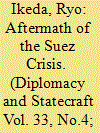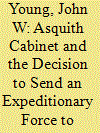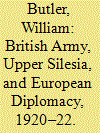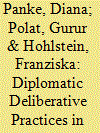|
|
|
Sort Order |
|
|
|
Items / Page
|
|
|
|
|
|
|
| Srl | Item |
| 1 |
ID:
189261


|
|
|
|
|
| Summary/Abstract |
There have been a great number of works on the Suez Crisis, but scarce academic attention has been paid to the process whereby its settlement was achieved. This paper argues that Britain succeeded in securing fairly sufficient Egyptian concessions with support from the US and the UN. The Americans, who had been hostile to the British prior to their agreement to withdraw troops from the Canal Zone, led the effort to make the Egyptians concede during negotiations on the Canal’s reopening. Contrary to the prevailing argument that Britain suffered a political defeat because of international pressure, this paper argues that Britain persuaded the US to acquiesce to the de facto arrangement because of the Canal’s economic value. The deployment of the UNEF brought a certain level of humiliation to Egyptian sovereignty. As Nasser’s influence in Middle Eastern affairs was contained, Britain chose a pragmatic deal with Egypt over the Canal.
|
|
|
|
|
|
|
|
|
|
|
|
|
|
|
|
| 2 |
ID:
189258


|
|
|
|
|
| Summary/Abstract |
The decision to send the British Expeditionary Force to France has been much discussed from the perspective of its long-term military-strategic background. Yet where the eventual decision to despatch the Force in August 1914 is concerned, limited attention has been paid to the role of the British Cabinet, which gave political approval to the step. Some historians have highlighted a Cabinet decision of 1 August against sending the BEF abroad and pointed out that Prime Minister H.H. Asquith and two key ministerial allies – Lord Haldane and Sir Edward Grey – accepted it. No one has provided a full analysis of why this trio of ministers consistently stuck to their position over the following days. Nor does a full explanation exist of the Cabinet’s eventual agreement, on 6 August, to approve the despatch of the Force. This analysis addresses these questions, arguing that far from being some reluctant step forced on the interventionists by their anti-war colleagues, Asquith, Haldane, and Grey pre-emptively decided to delay the despatch of the BEF. They did this as a way of preventing the disintegration of the government, while leaving open the possibility that Britain would go to war.
|
|
|
|
|
|
|
|
|
|
|
|
|
|
|
|
| 3 |
ID:
189259


|
|
|
|
|
| Summary/Abstract |
At the end of the First World War, Britain was at the limit of its capabilities, both militarily and diplomatically. Despite large reductions in the size of its armed forces, it had an increasing number of responsibilities as a victorious power. One of these responsibilities was to ensure the success of a plebiscite in Upper Silesia. It had little desire to do this but was compelled to provide support in order to counter French influence in the region, having to do so with minimal expertise and manpower. This article explores the decision-making which occurred in relation to the British role in Upper Silesia, placing it within the wider context of British strategic and diplomatic policy in the years immediately after the First World War, while also assessing the use (or not) of British civilian and military experts on the ground. Belatedly taking a role in the region certainly helped to aid a situation which was spiralling out of control, but highlights how a short-term outlook on foreign policy and decision-making hindered British efforts to exert influence in the region and further afield.
|
|
|
|
|
|
|
|
|
|
|
|
|
|
|
|
| 4 |
ID:
189262


|
|
|
|
|
| Summary/Abstract |
This article explores the intertwinement of politics, international affairs and culture during the Cold War through a case study of Polish-Dutch cultural relations and the heterogeneous factors that shaped them. The study centres around the turbulent events of 1968 in Poland, and their impact on the international cultural policies of the Polish People’s Republic and the Kingdom of the Netherlands. It demonstrates that the cultural field suffered the most immediate consequences of the political decisions taken by both parties – consequences which lasted for a considerable time – thus making it a metaphorical litmus test for the Cold War international relationships. This article reconstructs and analyses Polish and Dutch reactions to the 1968 events and their use of culture for the sake of their own policies – both as a form of protest and as an anti-crisis tool meant to influence the authorities and citizens of the target country.
|
|
|
|
|
|
|
|
|
|
|
|
|
|
|
|
| 5 |
ID:
189263


|
|
|
|
|
| Summary/Abstract |
This article assesses President Gerald Ford’s two major tours of Asia that saw him visit Japan, South Korea, China, the Philippines and Indonesia in 1974 and 1975. The trips were intended to reemphasise American commitment to longstanding allies in the Pacific, shore up recent gains in relations with Beijing, and boost his image with voters at home. On the first two points, Ford was broadly successful, but his moderate diplomatic achievements did not translate into electoral success. In assessing both the impact of his diplomacy and failure to leverage this domestically, the article demonstrates the importance of presidential diplomacy in furthering American interests, the power of the media in shaping the narratives of diplomatic travel, and the interconnected nature of domestic and foreign affairs. It also adds depth to our understanding of an often-overlooked administration and its impact on a region of crucial strategic importance to American foreign relations.
|
|
|
|
|
|
|
|
|
|
|
|
|
|
|
|
| 6 |
ID:
189266


|
|
|
|
|
| Summary/Abstract |
Scholars have demonstrated that deliberation between political actors in states as well as in International Organizations (IOs) matters because it can impact the quality and legitimacy of outcomes. Yet, we do not know much about how deliberation between political actors can be triggered in practice. Drawing on insights from the deliberative turn that has taken place in Comparative Politics as well as insights from International Relations, this paper inquires how different IO institutional features effect the extent of diplomatic deliberation. Unique and novel survey data shows that there is variation between and within IOs. In some IOs, such as the UNFCCC or CoE, diplomats engage in extensive deliberations, while they do so considerably less in others, such as the UNWTO or IWC. Our paper provides novel insights into the inner working of IOs. In general, diplomatic debates are most pronounced in large IOs with high level delegates that often opt for negotiating behind closed doors. In addition, specific institutional design elements matter in the different stages of an IO policy-cycle, such as procedural rules fostering interaction between diplomats in the negotiation stage or a limited policy scope in the voting stage.
|
|
|
|
|
|
|
|
|
|
|
|
|
|
|
|
| 7 |
ID:
189265


|
|
|
|
|
| Summary/Abstract |
For the past decade, a cruel and bloody civil war has wracked Syria. The conflict, and especially its military and humanitarian aspects, has been surveyed extensively. But like every war, that in Syria involves a ‘soft conflict’ in addition to the military confrontation. By this is meant the religious, educational, social, and cultural actions undertaken by the Shi’ite axis – the Syrian regime and its allies, Iran and Hezbollah – vis-à-vis the Sunni majority in the country. For Bashar Assad, a member of the Alawite sect, and his Shi’ite allies, the Sunnis pose a real threat, which can best be countered by converting them to Shi’ism.
|
|
|
|
|
|
|
|
|
|
|
|
|
|
|
|
| 8 |
ID:
189260


|
|
|
|
|
| Summary/Abstract |
This analysis revisits the State Department’s initial handling of the infamous Belmonte-Wendler letter during May-September 1941. Previous scholarship has focused heavily on the decision by British intelligence to forge and then share that letter as a means to spur American entry into the Second World War, with little disagreement among scholars about this side of the story. In comparison, however, the understanding of the State Department’s handling of the letter has become thoroughly muddled over time, with scholars regularly offering wildly inconsistent accounts, even despite only citing the same small handful of primary documents. Based on exhaustive archival research in records either overlooked by previous studies or since declassified, this assessment marshals a trove of fresh evidence to paint the most complete or accurate picture of who in the State Department knew the letter was a forgery, when and how they made this determination, and what they did to cover it up.
|
|
|
|
|
|
|
|
|
|
|
|
|
|
|
|
| 9 |
ID:
189264


|
|
|
|
|
| Summary/Abstract |
This article analyses the failure of American democracy promotion in Egypt before and during the 2011 Arab Spring, through a comparison with successful American support for democratic transitions in allied authoritarian regimes during the 1980s, executed through a combination of top-down diplomatic pressure and bottom-up democracy building by non-governmental organisations (NGOs). In Egypt, American policymakers misjudged the stability of the Mubarak regime and relaxed top-down pressure for liberalisation before the Arab Spring, while greater implementation of bottom-up democracy programs by United States government agencies resulted in the obstruction of these programs by the Mubarak regime and American policymakers. The case of Egypt illustrates the importance of American policymakers’ perceptions of regime stability for the priority which Washington accords to democracy promotion in policy towards allied authoritarian regimes, and the impact of American government control of bottom-up democracy programs on democracy building in allied authoritarian states.
|
|
|
|
|
|
|
|
|
|
|
|
|
|
|
|
|
|
|
|
|